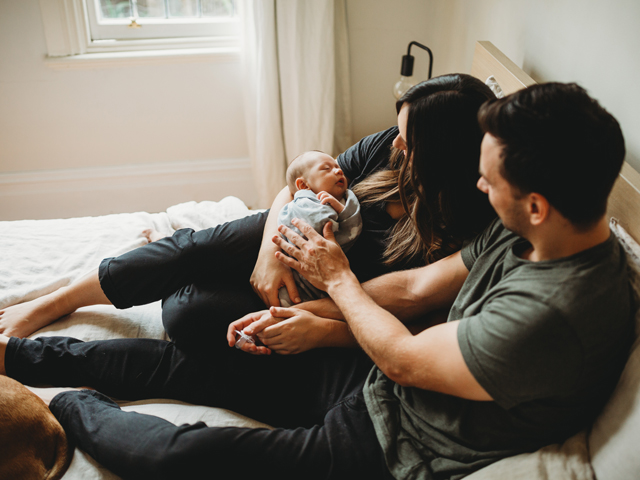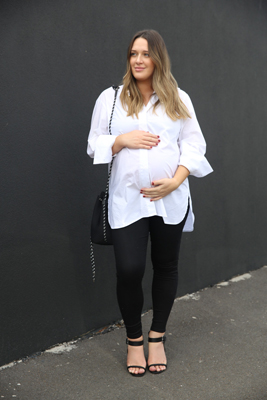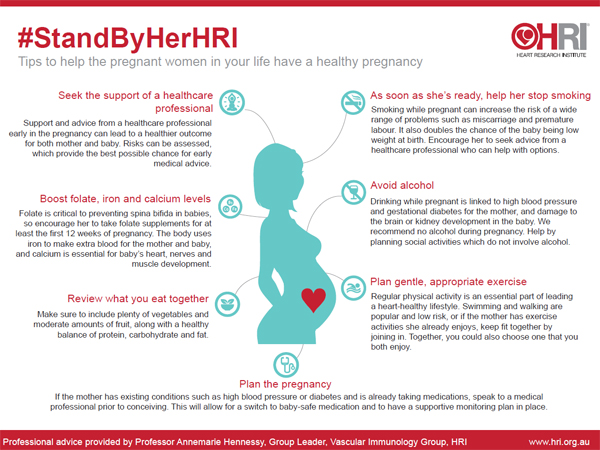Josie Barber #StandByHerHRI Interview

Heart Research Institute Launches #StandByHer To Support Mums-To-Be To Reduce Their Risk Of Heart Disease
In Australia, cardiovascular disease continues to take the lives of 22 females every day – killing almost three times more women than breast cancer. Preeclampsia and gestational diabetes developed during pregnancy, can significantly increase a woman's risk of heart disease later in life, but these can be manageable complications if monitored.
Each year 30,000 pregnant women in Australia will develop high blood pressure during their pregnancy, with 10,000 of these leading to preeclampsia. Further still, between 12-14 per cent of pregnant women will develop gestational diabetes.
Launching in-line with World Preeclampsia Day (Wednesday, 22 May), #StandByHerHRI is an educational movement from the Heart Research Institute (HRI) targeting the support network around expectant and new mothers.
"Heart disease is a leading killer of Australian women. Due to the heightened risks during pregnancy, it is especially important for women to take simple actions – from planning gentle exercise, to reviewing nutritional intake – for a healthier outlook post-partum and into later life," says Heart Research Institute Vascular Immunology Group Leader, Professor Annemarie Hennessy.
"We know that mum is super focused on baby's development during pregnancy, so the #StandByHerHRI campaign aims to empower the mother and those around her to support her in protecting her own health as well as baby's, and ensure that simple steps are taken to help her to keep it monitored, thereby lowering her risk of cardiovascular complications," added Professor Hennessy.
Preeclampsia
Preeclampsia (high blood pressure during pregnancy that negatively impacts mum and baby) is the most common serious medical disorder during pregnancy, with one in 10 women suffering from high blood pressure. It is the major cause of premature birth, and despite the high standards of pregnancy care in Australia, preeclampsia remains one of the major causes of stillbirths and newborn deaths in the country.
In addition, women who suffer from preeclampsia are 2-4 times more likely to develop high blood pressure in later life, twice as likely to suffer a stroke or heart attack, and their risk of death from heart-related issues increases by 1.5 times. Even more concerningly, research has also found the disease can occur prematurely, up to a decade earlier.
 Gestational Diabetes
Gestational Diabetes
In pregnancy, the hormones from the placenta can cause a woman's cells to become insulin resistant, meaning glucose levels in the blood rise. Normally the body produces more insulin to counter this, however, for some women this doesn't happen, and they develop gestational diabetes. This can then cause excess sugars and fats to cross the placenta, meaning babies may grow larger and increase the chance of problems with the birth.
Australian mother, Josie Barber, experienced gestational diabetes during her pregnancy with baby Flynn, and is a strong campaigner for greater awareness: "As a mum-to-be, all I cared about was making sure my little bump was safe and well. I wasn't concentrating on my own health, and had no idea about heart disease, or the risks posed to pregnant women.
"The #StandByHerHRI campaign is a great way to remind mother's to be of the importance of looking after themselves as well as baby, but also to empower those around her to provide support and help keep her heart healthy," added Barber.
What You Can Do
By promising to #StandByHerHRI through monitoring her heart health during pregnancy and beyond – especially if mum develops preeclampsia or gestational diabetes – Australian partners, parents and friends can help significantly lower the risk of their loved ones developing cardiovascular issues later in life.
HRI encourages Australians to get involved and help drive awareness this World Preeclampsia Day by:
Whether you're a mum, mum-to-be, or part of mum's network of support, share a picture of you and the woman you're standing by this World Preeclampsia Day and tell us how you're keeping heart healthy with #StandbyHerHRI
Sharing on social media to help raise awareness of these preventable complications
Australians can find out more about preventing heart disease in the women in their life by downloading a fact sheet via the Heart Research Institute website. www.hri.org.au/women
Each year 30,000 pregnant women in Australia will develop high blood pressure during their pregnancy, with 10,000 of these leading to preeclampsia. Further still, between 12-14 per cent of pregnant women will develop gestational diabetes.
Launching in-line with World Preeclampsia Day (Wednesday, 22 May), #StandByHerHRI is an educational movement from the Heart Research Institute (HRI) targeting the support network around expectant and new mothers.
"Heart disease is a leading killer of Australian women. Due to the heightened risks during pregnancy, it is especially important for women to take simple actions – from planning gentle exercise, to reviewing nutritional intake – for a healthier outlook post-partum and into later life," says Heart Research Institute Vascular Immunology Group Leader, Professor Annemarie Hennessy.
"We know that mum is super focused on baby's development during pregnancy, so the #StandByHerHRI campaign aims to empower the mother and those around her to support her in protecting her own health as well as baby's, and ensure that simple steps are taken to help her to keep it monitored, thereby lowering her risk of cardiovascular complications," added Professor Hennessy.
Preeclampsia
Preeclampsia (high blood pressure during pregnancy that negatively impacts mum and baby) is the most common serious medical disorder during pregnancy, with one in 10 women suffering from high blood pressure. It is the major cause of premature birth, and despite the high standards of pregnancy care in Australia, preeclampsia remains one of the major causes of stillbirths and newborn deaths in the country.
In addition, women who suffer from preeclampsia are 2-4 times more likely to develop high blood pressure in later life, twice as likely to suffer a stroke or heart attack, and their risk of death from heart-related issues increases by 1.5 times. Even more concerningly, research has also found the disease can occur prematurely, up to a decade earlier.
 Gestational Diabetes
Gestational DiabetesIn pregnancy, the hormones from the placenta can cause a woman's cells to become insulin resistant, meaning glucose levels in the blood rise. Normally the body produces more insulin to counter this, however, for some women this doesn't happen, and they develop gestational diabetes. This can then cause excess sugars and fats to cross the placenta, meaning babies may grow larger and increase the chance of problems with the birth.
Australian mother, Josie Barber, experienced gestational diabetes during her pregnancy with baby Flynn, and is a strong campaigner for greater awareness: "As a mum-to-be, all I cared about was making sure my little bump was safe and well. I wasn't concentrating on my own health, and had no idea about heart disease, or the risks posed to pregnant women.
"The #StandByHerHRI campaign is a great way to remind mother's to be of the importance of looking after themselves as well as baby, but also to empower those around her to provide support and help keep her heart healthy," added Barber.
What You Can Do
By promising to #StandByHerHRI through monitoring her heart health during pregnancy and beyond – especially if mum develops preeclampsia or gestational diabetes – Australian partners, parents and friends can help significantly lower the risk of their loved ones developing cardiovascular issues later in life.
HRI encourages Australians to get involved and help drive awareness this World Preeclampsia Day by:
Whether you're a mum, mum-to-be, or part of mum's network of support, share a picture of you and the woman you're standing by this World Preeclampsia Day and tell us how you're keeping heart healthy with #StandbyHerHRI
Sharing on social media to help raise awareness of these preventable complications
Australians can find out more about preventing heart disease in the women in their life by downloading a fact sheet via the Heart Research Institute website. www.hri.org.au/women
Interview with Josie Barber
Question: Can you tell us about your experience with gestational diabetes?
Josie Barber: I was diagnosed with gestational diabetes in my 28th week of pregnancy with my (now 1-year old son, Flynn). After a week of monitoring my blood sugar levels it became clear that I also needed to be on daily insulin injections as my fasting blood sugar levels were too high and unable to be lowered with diet and lifestyle changes.
It's a complete change in your diet and lifestyle, having gestational diabetes! You have to immediately change your diet to have minimal to no sugar, and low GI. You also have many more appointments during your pregnancy; you're monitored a lot more closely.
Question: Prior to pregnancy did you know about gestational diabetes?
Josie Barber: I had definitely heard of gestational diabetes prior to having it, but it was not something I knew much about at all. I hadn't known anyone who had experienced it and I definitely never thought it would happen to me.
Question: What gestational diabetes symptoms did you experience?
Josie Barber: It's really not the kind of thing that has visible symptoms, just higher than normal blood sugar levels.
 Question: Once your baby was born, did your gestational diabetes disappear?
Question: Once your baby was born, did your gestational diabetes disappear?
Josie Barber: Yes, as soon as the placenta is delivered the diabetes just disappears basically. They do monitor your blood sugar levels for the following 24 hours after the birth to confirm though.
Question: What do you do now to decrease your risk of developing heart disease later in life?
Josie Barber: Well until coming on board to work on this campaign with the Heart Research Institute I wasn't actually aware of the risks women who have experienced gestation diabetes and preeclampsia have later in life. But going forward I'm going to always to do my best to always live a healthy and active lifestyle.
Question: Can you share your advice for a healthier pregnancy?
Josie Barber: I think it's very important for physical and mental health to try your best to do something active every day, even if it's just a short walk outside with the dog. Also ensuring your diet is as healthy and balanced as possible.
Question: How can we support the StandByHerHRI campaign?
Josie Barber: You can help support the StandByHerHRI campaign by calling on all partners, sisters and parents to 'Stand By Her' during pregnancy to ensure mums heart health is always monitored regularly by our healthcare professionals.
Interview by Brooke Hunter
Josie Barber: I was diagnosed with gestational diabetes in my 28th week of pregnancy with my (now 1-year old son, Flynn). After a week of monitoring my blood sugar levels it became clear that I also needed to be on daily insulin injections as my fasting blood sugar levels were too high and unable to be lowered with diet and lifestyle changes.
It's a complete change in your diet and lifestyle, having gestational diabetes! You have to immediately change your diet to have minimal to no sugar, and low GI. You also have many more appointments during your pregnancy; you're monitored a lot more closely.
Question: Prior to pregnancy did you know about gestational diabetes?
Josie Barber: I had definitely heard of gestational diabetes prior to having it, but it was not something I knew much about at all. I hadn't known anyone who had experienced it and I definitely never thought it would happen to me.
Question: What gestational diabetes symptoms did you experience?
Josie Barber: It's really not the kind of thing that has visible symptoms, just higher than normal blood sugar levels.
 Question: Once your baby was born, did your gestational diabetes disappear?
Question: Once your baby was born, did your gestational diabetes disappear? Josie Barber: Yes, as soon as the placenta is delivered the diabetes just disappears basically. They do monitor your blood sugar levels for the following 24 hours after the birth to confirm though.
Question: What do you do now to decrease your risk of developing heart disease later in life?
Josie Barber: Well until coming on board to work on this campaign with the Heart Research Institute I wasn't actually aware of the risks women who have experienced gestation diabetes and preeclampsia have later in life. But going forward I'm going to always to do my best to always live a healthy and active lifestyle.
Question: Can you share your advice for a healthier pregnancy?
Josie Barber: I think it's very important for physical and mental health to try your best to do something active every day, even if it's just a short walk outside with the dog. Also ensuring your diet is as healthy and balanced as possible.
Question: How can we support the StandByHerHRI campaign?
Josie Barber: You can help support the StandByHerHRI campaign by calling on all partners, sisters and parents to 'Stand By Her' during pregnancy to ensure mums heart health is always monitored regularly by our healthcare professionals.
Interview by Brooke Hunter
MORE



